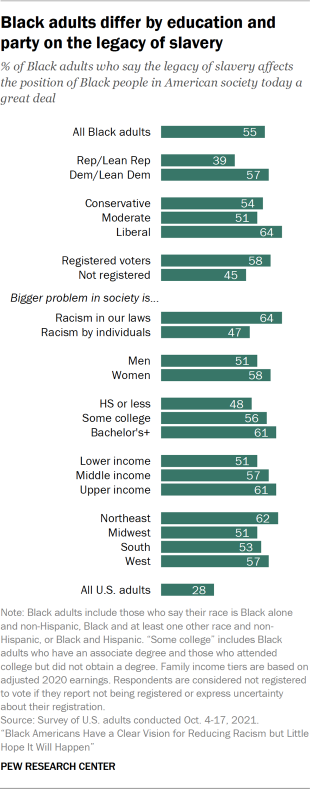
Discussions about atonement for the enslavement of Black Americans has a long history in the United States. Most famously, General William T. Sherman drafted Special Field Order 15 in 1865. The order stipulated that Confederate land seized in Georgia and South Carolina would be split among formerly enslaved Black people in those states, no more than 40 acres per family.
Black Americans commonly refer to this measure as “40 acres and mule,” and it has become a long-standing symbol for both the promise of and pessimism about repayment for slavery, or reparations.
Efforts toward reparations have continued into the 21st century. In 2021, Evanston, Illinois, became the first U.S. city to create a reparations plan for its Black residents. And in 2022, Harvard University created a $100 million fund for Black students who are descendants of enslaved people.
Given this enduring history, the survey asked Black Americans to share their views on the impact of slavery on their position in the United States; whether the descendants of enslaved Black people should be repaid for the labor of their ancestors; the forms of repayment that would be most helpful; the institutions or individuals who bear responsibility for repayment; and the likelihood that repayment would occur in their lifetime.
The legacy of slavery affects Black Americans today
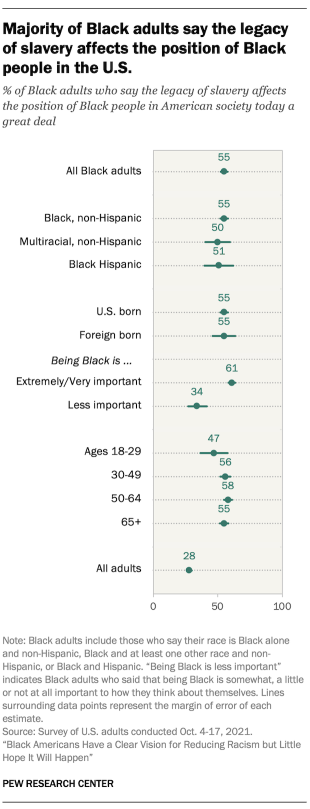
Nearly six-in-ten Black adults (57%) say their ancestors were enslaved. This includes 41% who report their ancestors were enslaved in the U.S. and 5% who say they were enslaved outside the U.S., as well as another 11% who say their ancestors were enslaved both in the U.S. and in another country. However, not all Black Americans are certain whether their ancestors were enslaved, and some indicate their ancestors were not enslaved at all. About one-third (34%) say they are unsure if their ancestors were enslaved, while 8% say their ancestors were not enslaved.
Despite differences in their personal knowledge about the enslavement of their ancestors, a large majority of Black adults (85%) say the legacy of slavery affects the position of Black people in the U.S. today. This includes 55% who say the legacy of slavery affects Black people a great deal and 30% who say it affects them a fair amount. Much smaller shares of Black adults say the legacy of slavery does not have much (9%) or any effect (4%) on the position of Black people in the U.S. today.
Among Black Americans, political party affiliation, educational attainment and income are important points of difference in views on this question. The share of Black Democrats and Democratic leaners (57%) who say the legacy of slavery affects Black people a great deal outpaces the share of Black Republicans and Republican leaners (39%) who say the same.
Black adults who identify as politically liberal (64%) are more likely than those who identify as moderate (51%) or conservative (54%) to say the legacy of slavery affects the position of Black people a great deal. And Black adults who say they are registered to vote (58%) are more likely than those who say they are not registered (45%) to say the same.
Black adults with a bachelor’s degree or higher level of education (61%) are more likely than those with a high school diploma or less (48%) and those with some college education but no bachelor’s degree (56%) to say that the legacy of slavery affects the position of Black people a great deal. And Black adults with upper (61%) and middle incomes (57%) are more likely than those with lower incomes (51%) to say this.
There are also regional differences among Black adults on this question. Those who live in the Northeastern U.S. (62%) are more likely than those in the South (53%) or the Midwest (51%) to say the legacy of slavery affects Black people a great deal. But no matter which region of the country they are in, at least seven-in-ten Black adults say slavery’s legacy affects Black people in the U.S. today at least a fair amount.
Black adults do not differ by ethnicity or immigrant status on this issue. Non-Hispanic Black adults (55%) are about as likely as multiracial (50%) and Hispanic (51%) Black adults to say that the legacy of slavery affects Black people a great deal. Likewise, U.S.-born Black adults (55%) are about as likely as Black immigrants (55%) to say this.
Among the general public, only 28% say the legacy of slavery affects the position of Black people in the U.S. today a great deal. Four-in-ten U.S. adults (40%) say the legacy of slavery has little to no effect on the position of Black Americans in the country today.
Most Black adults agree the descendants of enslaved people should be repaid
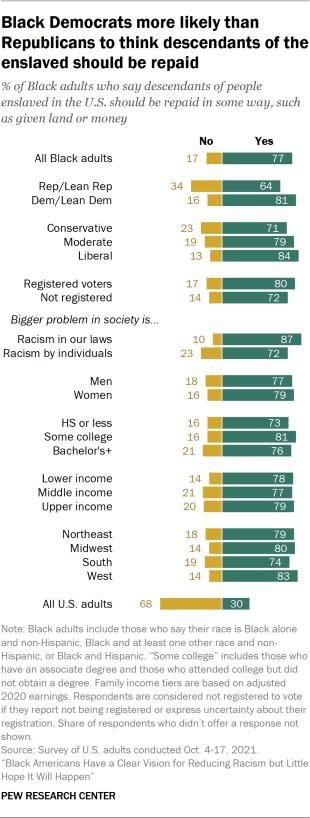
A large majority of Black adults (77%) think the descendants of people enslaved in the U.S. should be repaid in some way, a view widely shared across many demographic subgroups of Black Americans. Black adults’ differences on this question fall primarily along the lines of political affiliation.
Although the majority of Black adults in both partisan coalitions think descendants of those enslaved in the U.S. should be repaid, Democrats (81%) are more likely to hold this view than Republicans (64%).
Black liberals (84%) and moderates (79%) are more likely than conservatives (71%) to say that descendants of the enslaved should be repaid. And Black adults who say they are registered to vote (80%) are more likely than those who report they are unregistered (72%) to support reparations for slavery.
Notably, large majorities of almost all these groups support reparations for the descendants of those enslaved in the U.S.
Black adults’ support for reparations also differs based on their views of identity and society. In the survey, Black adults were asked how important being Black was to how they think about themselves and also whether racist laws or racist individuals are a bigger problem for Black people in the U.S. today.
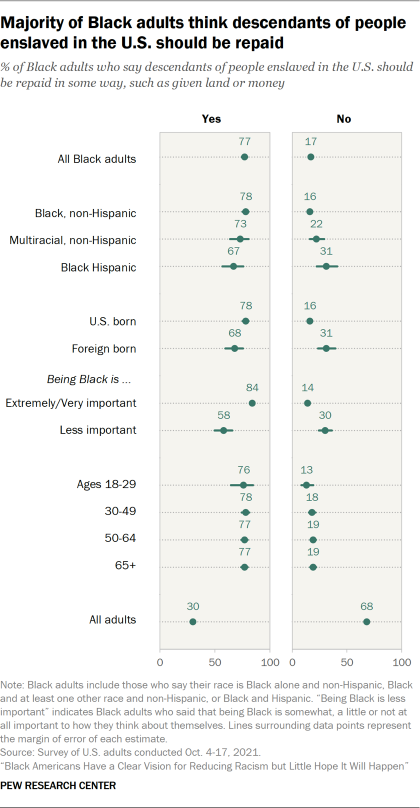
Black adults who say that being Black is extremely or very important to their personal identity (84%) are more likely to support reparations for slavery than those who say that being Black is somewhat, a little or not at all important to them (58%).
And Black adults who say racist laws are a bigger problem for Black people (87%) are more likely than those who say racist individuals are the bigger problem (72%) to support reparations, though large majorities of both groups still agree.
While nearly three-quarters or more of Black adults across education and income levels support reparations, about one-in-five Black adults with a bachelor’s degree (21%) as well as Black adults with middle (21%) or upper incomes (20%) do not think descendants of enslaved people should be repaid.
The pattern of wide support for reparations among Black adults is reversed when it comes to the general public. Just 30% of all U.S. adults say descendants of enslaved people should be repaid in some way, a much lower share than the 77% of Black adults who say the same. In fact, nearly seven-in-ten among the public overall (68%) say descendants of people enslaved in the U.S. should not be repaid, compared with 17% of Black adults who say the same.
The types of repayment Black adults think would be most helpful
Black adults who say descendants of enslaved people should be repaid were asked how helpful the following forms of repayment would be: educational scholarships, financial assistance for starting or improving a business, financial assistance for buying or remodeling a home, and cash payments.
Overall, about three-quarters or more of Black adults who support reparations say scholarships (80%) and financial assistance for businesses (77%) and for homes (76%) would be extremely or very helpful for descendants of enslaved people. Fewer say the same about cash payments (69%). Although majorities across most Black demographic groups say each of these forms of repayment would be extremely or very helpful, a few differences by age, education and income stand out.
Of those who support reparations, Black adults ages 65 and older (85%) are slightly more likely than those 30 to 49 (78%) to say that educational scholarships would be extremely or very helpful. Black adults with a bachelor’s degree or higher level of education (83%) and those with some college education but no bachelor’s degree (82%) are more likely than those with a high school diploma or less (75%) to say that scholarships would be extremely or very helpful. And Black adults with upper and middle incomes (both 84%) are more likely than those with lower incomes (75%) to say this.
Meanwhile, some Black adults were more likely than others to say cash payments would be extremely or very helpful. Black adults with a high school diploma or less (70%) as well as those with some college but no four-year degree (73%) are more likely than those with a bachelor’s degree (62%) to say cash payments would be extremely or very helpful. And the shares of Black adults with lower (72%) and middle incomes (68%) who say that cash payments would be extremely or very helpful are larger than the share of upper-income Black adults (57%) who say the same.
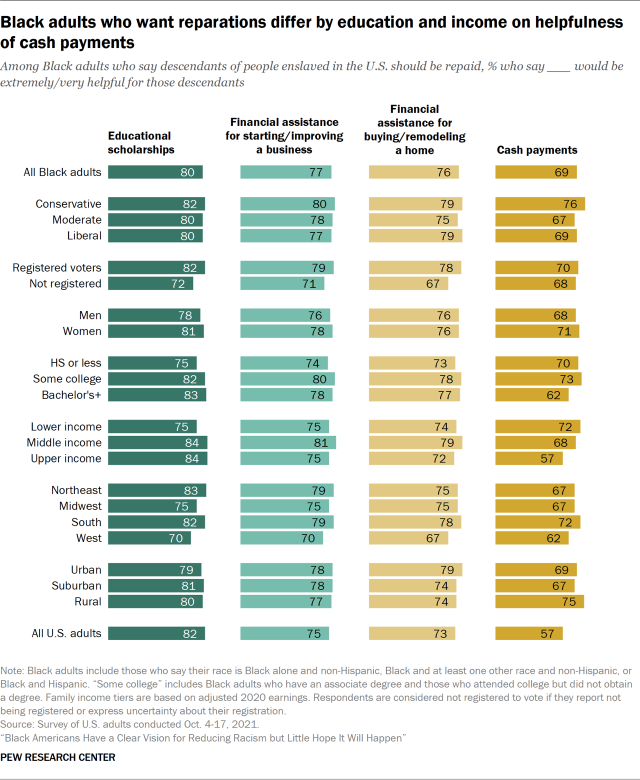
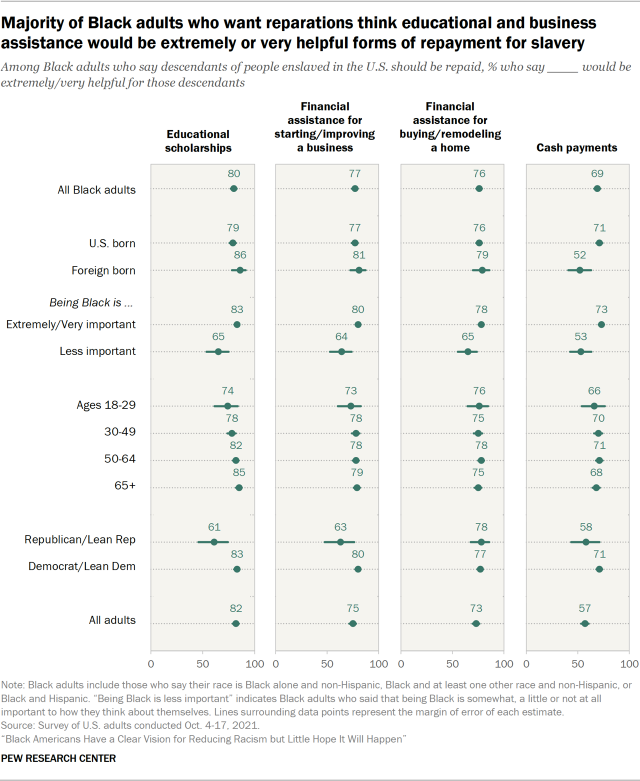
Responsibility for reparations and the likelihood repayment will occur
Black adults who say descendants of enslaved people should be repaid were also asked about the institutions and individuals who bear responsibility for repayment and whether repayment, of any type or from any source, would happen in their lifetime. Overall, Black adults are pessimistic about the likelihood of reparations, but a large majority say the U.S. federal government should have all or most of the responsibility for repayment.
Black registered voters most likely to point to the federal government and businesses for repayment
Among Black adults who support reparations, about eight-in-ten (81%) say the U.S. federal government should have all or most of the responsibility for repaying descendants of people enslaved in the U.S. A similar share (76%) says the same about businesses and banks that profited from slavery. Slightly smaller shares say that college and universities that benefited from slavery (63%) and the descendants of families who engaged in the slave trade (60%) should have all or most of the responsibility for reparations.
Black adults differ slightly on this question by voter status, education and income. Black adults who are registered to vote (84%) are more likely than those who are unregistered (73%) to say the federal government should bear all or most of the responsibility for repaying the descendants of enslaved people. Black registered voters are also more likely than those who are unregistered to say that business and banks that profited from slavery as well as colleges and universities that benefited from slavery should have all or most of the responsibility for repayment.
However, Black registered voters are not more likely than those who are unregistered to say that descendants of families who engaged in the slave trade should bear all or most of the responsibility for repayment.
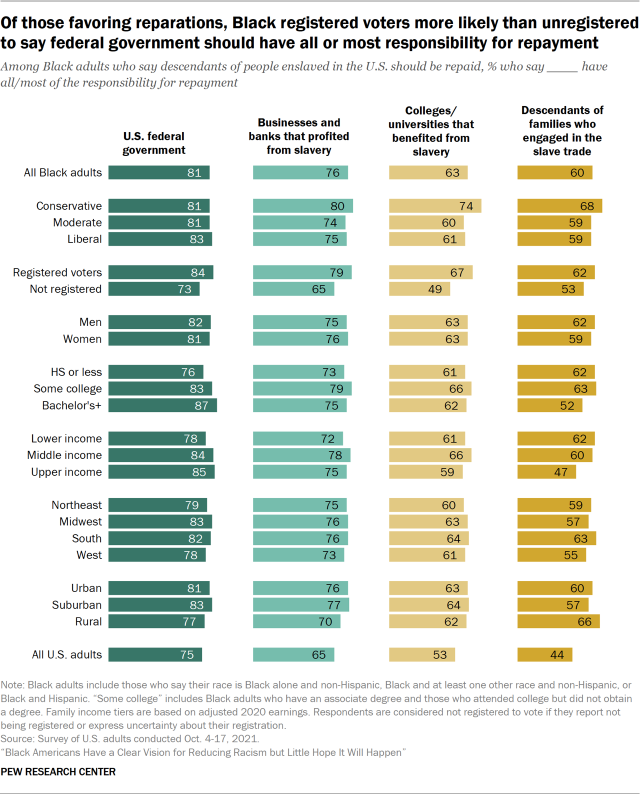
Black adults with a bachelor’s degree (87%) and those who have attended college but did not obtain a bachelor’s degree (83%) are more likely than those with a high school diploma or less education (76%) to say that the U.S. federal government should bear all or most of the responsibility for reparations. And Black adults with upper (85%) and middle incomes (84%) are also more likely than those with lower incomes (78%) to say this.
Although Black adults do not differ much by education or income on whether businesses or colleges should have all or most of the responsibility for repayment, they have differences on whether descendants of families who engaged in the slave trade should. Black adults with a high school education (62%) and those with some college but no bachelor’s degree (63%) are more likely than those with a bachelor’s degree (52%) to say that descendants of families that engaged in the slave trade should have all or most of the responsibility for repayment. Those with lower and middle incomes (62% and 60%, respectively) are more likely than upper-income Black adults (47%) to say this.
Black adults differ by political ideology on two of the sources for repayment. Black conservatives (74%) are more likely than moderates (60%) or liberals (61%) to say that colleges and universities should have all or most of the responsibility for repaying the descendants of people enslaved in the U.S. Black conservatives (68%) are again more likely than moderates or liberals (59% each) to say that descendants of families that engaged in the slave trade should have all or most of the responsibility.
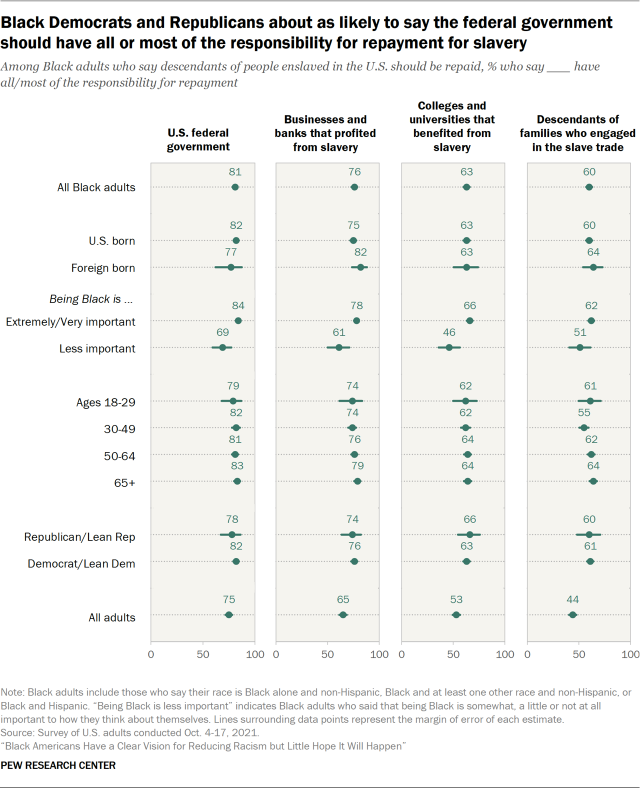
Most Black adults say repayment for slavery will not occur in their lifetime
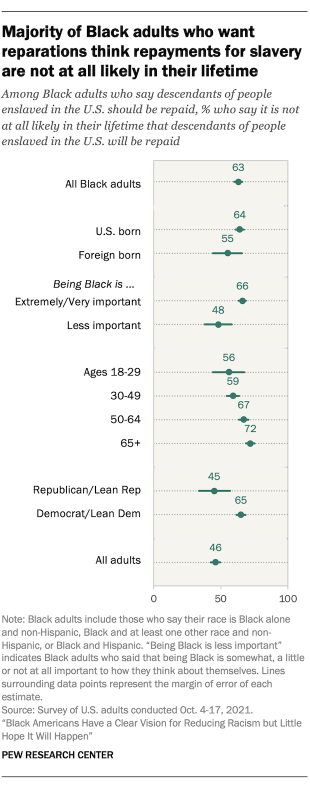
Although most Black adults say descendants of slavery should be repaid, very few of those who want reparations say that such repayment is likely in their lifetime. Only 7% of Black adults who support reparations say it is extremely or very likely that descendants of people enslaved in the U.S. will be repaid in their lifetime, and only about one-in-ten (11%) say it is somewhat likely. Roughly eight-in-ten Black adults (82%) say repayment is a little or not at all likely. In fact, a majority of Black adults who support reparations (63%) say repayment for slavery is not at all likely to happen in their lifetime.
Age, education, income and party are key points of difference in Black adults’ views on the likelihood of reparations. Black adults ages 65 and older (72%) are the most likely to say reparations would not be paid in their lifetime, compared with 67% of those ages 50 to 64, 59% of those 30 to 49 and 56% under 30.
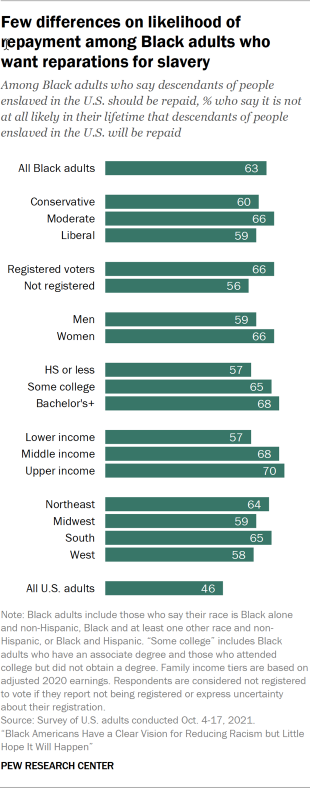
Black adults with a bachelor’s degree (68%) and those who attended college but do not have a bachelor’s degree (65%) are more likely than those with a high school education (57%) to say that repayment for slavery will not occur in their lifetime. And Black adults with upper (70%) and middle incomes (68%) are more likely than those with lower incomes (57%) to say this.
Among Black partisans who support reparations, Democrats (65%) are more likely than Republicans (45%) to say reparations would not occur in their lifetime.
Conversely, Black Republicans who support reparations (17%) are more likely to say repayment in their lifetime is extremely or very likely than Black Democrats who support reparations (6%). And among Black registered voters, 66% who support reparations say repayment will not occur in their life, compared with 56% of Black adults who are unregistered.